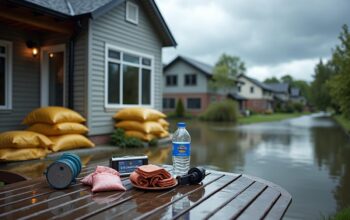
Plumbing maintenance is a crucial aspect of home upkeep that ensures systems run efficiently and avoid potentially costly repairs. For those who prefer to roll up their sleeves and tackle these tasks themselves, DIY plumbing offers an affordable approach to home maintenance.
In North Lakes, DIY enthusiasts face unique challenges, ranging from understanding local building codes to finding the right tools and materials. This guide aims to provide practical, budget-friendly plumbing tips suitable for North Lakes residents, ensuring that even the most amateur plumber can perform essential repairs with confidence.
Contents
Understanding Basic Plumbing Systems
Having a fundamental understanding of plumbing systems is essential for any DIY enthusiast. Most homes in North Lakes have a straightforward plumbing structure consisting of water supply lines, drains, and vent systems. These components work together to ensure clean water enters the home, waste is carried away, and atmospheric pressure is maintained to allow water flow.
Regular maintenance of these systems is indispensable for preventing expensive repairs. For instance, checking and replacing washers on taps can stop minor leaks from becoming significant issues. Also, making sure drains are clear can prevent blockages that might otherwise require professional intervention.
Sourcing inexpensive plumbing supplies in North Lakes can be done by visiting local hardware stores or looking for deals online. Exploring store discounts or neighbourhood garage sales might offer access to needed tools or materials at a fraction of the cost.
Essential Tools Every North Lakes DIY Plumber Needs
Equipping oneself with the right tools is the first step in successful DIY plumbing. Basic tools like a pipe wrench, plunger, and adjustible spanner are vital for handling standard plumbing repairs. When it comes to buying these tools in North Lakes, it’s advisable to look for stores offering promotions or consider purchasing second-hand tools that are still in good condition.
For those tight on space or budget, multi-function tools can provide versatility. A single tool that performs multiple functions can replace several individual tools, saving both money and storage space.
To ensure the longevity of plumbing tools, proper maintenance is critical. After each use, clean and dry the tools to prevent rust. Additionally, store them in a dry place to protect them from moisture damage. A well-organised tool kit will not only extend the life of the tools but also make finding the right tool for the job much easier.
Preventative Maintenance Tips to Save Money
Implementing a regular routine of simple checks can go a long way in identifying potential plumbing issues before they develop into significant problems. Regularly inspect pipes and hoses for small leaks or signs of wear. Likewise, periodically check toilets for running water, which can indicate a faulty part.
In staying eco-friendly, consider installing low-flow showers and taps. Not only do they help the environment by reducing water consumption, but they can also significantly decrease water bills over time.
Preventing common issues like clogs and leaks is mainly about vigilance. Use drain covers to catch hair or food particles before they cause blockages. Regularly clean these covers to ensure maximum effectiveness.
North Lakes experiences a variety of weather conditions throughout the year. Seasonal maintenance, such as insulating exposed pipes during cooler months, can save homeowners from more significant repairs down the track.
DIY Solutions for Common Plumbing Issues
When it comes to fixing leaks and drips, it’s essential to start with a step-by-step approach. First, ensure the water supply to the affected area is turned off. Often, replacing a washer or tightening a loose fixture can resolve minor leaks.
Clogs in drains can usually be dealt with using simple methods. Rather than resorting to harsh chemicals, consider using a mixture of baking soda and vinegar to naturally dissolve deposits. A plunger or plumber’s snake can also be effective for more stubborn clogs.
Adjusting water pressure is another common task that can improve water flow efficiency. Start by checking the water pressure regulator. Sometimes, a simple tweak is all that’s needed to optimise water pressure.
Remember, safety should always be a top priority in any DIY project. Wear appropriate protective gear when working on plumbing tasks, ensure clear and dry working conditions to prevent slips, and be cautious when using sharp tools or dealing with hot water.
When to Call in the Professionals
While DIY plumbing can save money and be satisfying, certain situations demand professional expertise. If a problem seems beyond one’s skills or concerns a major water supply shut-off, it’s time to call in the experts. Watching for persistent issues, such as intermittent leaks or unexplained water pressure drops, is crucial.
If professional intervention is necessary, choosing an affordable and reliable plumber in North Lakes is key. Look for local recommendations or check online reviews to ensure the chosen plumber offers quality service at a reasonable price.
It’s also important to recognise when DIY efforts may accidentally lead to more significant issues. Over-tightening a tap, for example, can cause unnecessary damage. Acknowledging one’s limitations and calling in professionals early can save time and money in the long run.
Certain professional services can complement DIY efforts, offering value and expertise. For instance, an annual inspection by a certified plumber can identify hidden issues and provide peace of mind.
Conclusion
Embracing DIY plumbing tips can lead to affordable solutions and foster a deeper understanding of one’s home systems. Finding the balance between tackling tasks independently and knowing when to seek professional help is essential.
As skills develop, a DIY enthusiast can take on more complex tasks and keep learning. Why not share success stories and tips with like-minded homeowners to build a supportive community that thrives on collaborative knowledge?


